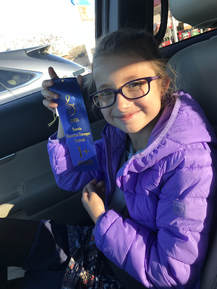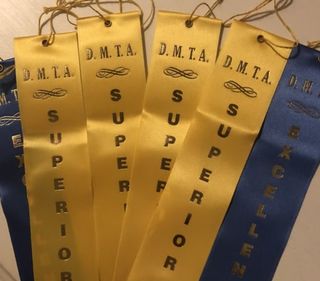|
-Eliana Yi
There are cures for most illnesses and symptoms, and performance anxiety has very much been treated in that way. There are beta-blockers, medication that prevents the body from over-stressing, bananas (which have attributes that help your heart remain calm), hand-warmers to keep your fingers from getting too cold and microfiber cloths (if instead of cold hands you get sweaty palms). There are psychological ways to treat it too; meditation before a performance, breathing exercises to allow oxygen to get up to the brain, and talking to yourself in the mirror and sending yourself positive messages. All these things I have tried, staring at myself in a public restroom, wringing a hand-warmer packet to death and repeating the phrase "You are fine. You are good. This will be okay." (meanwhile attracting curious glances from strangers). I think that all these strategies ever did was distract me from the performance itself. Perhaps that was a good thing, to make me feel as if I was taking care of a problem but when it came time to actually perform, one banana could not hold back my flood of nerves. Up until recently, every performance was its own unique kind of meltdown that I had no way of preparing for. I still have a long ways to go in terms of performance, but I think the only solution to beating performance anxiety is the same solution for all aspects of piano. PRACTICE PERFORMING...which means...just perform. Perform all the time. Perform whenever you can. Do it for your friends, your family, your church, your school. Every time you play for your piano teacher, treat it as a performance. If no one is there, record yourself using a phone or a tablet. It is not that performance gets easier the more you do it, but you will get used to making mistakes in front of an audience. You will learn how to recover faster, how to cover up errors and think on your feet. You will have bad performances, but they will be outnumbered by good ones if you keep trying, I promise. For our MSS students stressing about this upcoming recital, please understand that this is nothing like the STAAR test. You've all taken the STAAR this year in school right? And if you don't pass, you don't get to move on to the next grade. It's too easy to think about recitals in the same way, but recitals and tests are nothing alike. No one is giving you a grade, they just want to enjoy your music. So you should be focusing on that too. Not getting everything right, but making everything you play fun and enjoyable. So parents and students, what should we do between now and May 19th? I'll keep this post simple with a to-do list:
With all of this preparation, and with so many instructions to follow, your brain will be too busy making music to be nervous. And if you focus on making music, your personality will also show through. Beethoven says it better than I: “To play a wrong note is insignificant; to play without passion is inexcusable.”
0 Comments
-Stathia Orwig When our students participate in Dallas MTA activities, I am asked frequently what judge’s scores mean and what they are judged on. DMTA does give clear guidelines to their judges, but we always remember that each critique is usually one person’s subjective opinion. Scores go from I+, being the highest grade to III, being the lowest. There can be pluses and minuses attached each. Here’s a little about what the scores mean (taken from the DMTA handbook): I+ : An artistic performance that has tonal variety and technical fluency. The music is projected with poise, imagination, stylistic freedom and rhythmic vitality. I: An excellent performance, showing accuracy in notes and rhythm, tempo control, technical facility and continuity. This performance tends to lack the vitality and authority of artistry. II: A prepared performance, mostly accurate in notes, rhythm, dynamics and memory, but lacking in one or more of the following areas: tonal beauty, balance, technical ease, awareness of phrasing, or appropriate tempo. III: A tenuous performance with many inaccuracies. Practice habits need to be improved. NFP: Further preparation needed in all areas. We love our students to have their piece(s) memorized at least a couple of weeks before their performance date. This allows for solid memory and ownership of their piece(s). Often in those last couple of weeks, we are working on bring that piece “to life” and adding in all of the finishing touches to really lead to getting a I+ on their critique!
Activities such as Jazz/Pop Contest and Sonatina Festival allow students to get their critique and award immediately for that year. Achievement Auditions is different in that students get their critique and possible ribbon, but accumulate points each year they enter. Once they get to 15 points, which takes a minimum of 3 years, they get a trophy. Then, trophies are awarded every 10 points, so 25 points, 35 points, and so on. It really does emphasize the hard work and determination of each student! Once teachers receive their student critique, we always read over it with our student in their next lesson. The opportunity to play in these festivals and contests allows our students to have another opinion on their playing and what they can do to improve their playing and musicianship. |
Archives
July 2024
Categories
All
|
|
|
MUSIC SO SIMPLE
|


 RSS Feed
RSS Feed